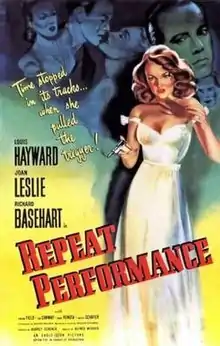| Repeat Performance | |
|---|---|
 Theatrical release poster | |
| Directed by | Alfred L. Werker |
| Screenplay by | Walter Bullock |
| Based on | Repeat Performance 1942 novel by William O'Farrell |
| Produced by | Aubrey Schenck |
| Starring | Louis Hayward Joan Leslie Tom Conway |
| Cinematography | L. William O'Connell |
| Edited by | Louis Sackin |
| Music by | George Antheil |
| Color process | Black and white |
Production company | Bryan For Productions |
| Distributed by | Eagle-Lion Films |
Release date |
|
Running time | 92 minutes |
| Country | United States |
| Language | English |
| Budget | $600,000[1] or $1.3 million[2] |
Repeat Performance is a 1947 American film noir (with fantasy elements) starring Louis Hayward and Joan Leslie. The film was released by Eagle-Lion Films, directed by Alfred L. Werker, and produced by Aubrey Schenck.
Plot
On New Year's Eve 1946, Sheila Page is standing over her dead husband Barney with a gun in her hand. She panics and goes to two friends for help. While seeking help from the friends at a pair of parties, she wishes that she could live 1946 all over again.
Magically, on the way to see the trusted producer John Friday for advice, she tells the poet William Williams about her desire for a re-do exactly at the strike of midnight on New Year's. Her wish is granted and she is transported back to the beginning of 1946 with her husband alive. She attempts to relive the year without making the mistakes she and her friends made throughout the year, but certain events repeat themselves, including Williams being committed to a psychiatric institution. Nonetheless, Sheila is left to question whether there really is such a thing as fate or not.
The story climaxes again on New Year's Eve, when through Sheila's interferences over the year, her husband, a sloppy alcoholic hopelessly devoted to Paula Costello, a now-indifferent fellow playwright, becomes convinced that his spouse is trying to destroy him. He violently confronts her. This time, her friend William, who believes in Sheila's foresight, shoots her husband with her gun.
Cast
- Louis Hayward as Barney Page
- Joan Leslie as Sheila Page
- Virginia Field as Paula Costello
- Tom Conway as John Friday
- Richard Basehart as William Williams
- Natalie Schafer as Eloise Shaw
- Benay Venuta as Bess Michaels
- Ilka Grüning as Mattle
- John Ireland as Narrator (uncredited)
- Eric Wilton as Reveler (uncredited)
Production
There were various actors and directors in mind for the film, with Jules Dassin once in mind to direct while Franchot Tone and Constance Dowling were tapped in mind for the lead roles. Eventually, Dowling was dropped for Sylvia Sidney in mind. All of the considerations would instead be washed away for Alfred L. Werker to direct for Joan Leslie and Louis Hayward. The film reversed the original story that involves Barney having been the one killing his lover before he relives the previous year and Sheila being a drunk. This was evidently done due to the perception that Joan Leslie could not play a villain.[1] Also, in the book by William O'Farrell, the Richard Basehart character called William Williams was a cross dressing poet.[3] Eagle-Lion, noticing the good reviews for Basehart, gave him higher billing and even gave the film a premiere showing in his home town of Zanesville, Ohio.
Restoration
The film was restored after a screening in 2007 featuring a guest appearance by cast member Joan Leslie resulted in the discovery that a 35mm print had badly decomposed. The Film Noir Foundation, UCLA and others then followed up with restoration of the film, now available on Blu Ray.[3]
Remake
This film was remade as the television film Turn Back the Clock (1989) directed by Larry Elikann. It featured Connie Sellecca, David Dukes, Jere Burns, Wendy Kilbourne and original cast member Joan Leslie.
See also
References
- 1 2 Tom Weaver, It Came from Horrorwood: Interviews with Moviemakers in the SF and Horror Tradition McFarland, 2000 p 272
- ↑ "Eagle-Lion's US Performance Reviewed by Foy in NY", Variety, 19 March 1947 p 13
- 1 2 "Turner Classic Movies "Noir Alley" with host Eddie Muller on "Repeat Performance" (1947)".